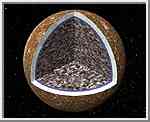|
COMETS EARTH JUPITER KUIPER BELT MARS MERCURY METEORITES NEPTUNE OORT CLOUD PLUTO SATURN SOLAR SYSTEM SPACE SUN URANUS VENUS ORDER PRINTS
PHOTO CATEGORIES SCIENCEVIEWS AMERICAN INDIAN AMPHIBIANS BIRDS BUGS FINE ART FOSSILS THE ISLANDS HISTORICAL PHOTOS MAMMALS OTHER PARKS PLANTS RELIGIOUS REPTILES SCIENCEVIEWS PRINTS
|
Related Document
Download Options
This artistic cutaway view shows a model of the interior of Jupiter's moon Callisto. Before the Galileo spacecraft, Callisto was thought to be an inactive moon -- just a chunk of rock and ice. Data recently obtained from the Galileo spacecraft has revealed the surprising result that Callisto might have a salty ocean lying beneath its icy crust. Callisto is the most heavily cratered satellite in the solar system. Its battered surface lies on top of an icy layer (shown as a whitish band) that is about 200 kilometers (124 miles) thick. The crust is very ancient and dates back 4 billion years, just shortly after the solar system was formed. The new data from Galileo indicates that beneath the crust lies an ocean as indicated by the blue band. The depth of the ocean probably exceeds 10 kilometers (6 miles). "The new [Galileo] data certainly suggest that something is hidden below Callisto's surface, and that something may very well be a salty ocean," said Dr. Margaret Kivelson, space physics professor at the University of California at Los Angeles. The premise of an ocean came from studying the magnetic fields around Jupiter and its moons. It was found that Callisto's magnetic field varies (flows in various directions at different times) in response to the background magnetic field generated by Jupiter. Beneath the ocean, Callisto seems to have a strange interior that is not entirely uniform and does not vary dramatically. Prior to Galileo, scientists believed that Callisto's interior was totally undifferentiated, but Galileo data suggests that the interior is composed of compressed rock and ice with the percentage of rock increasing as depth increases. |
||||||||||||||||||||||||||||||||||||
